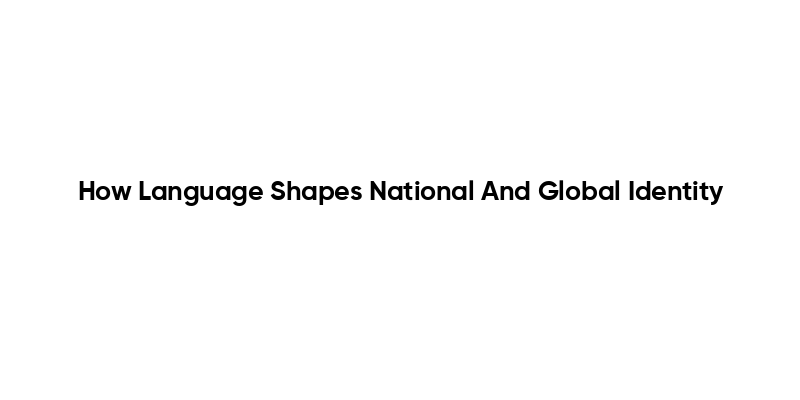Language is more than just a means of communication; it is a powerful tool that shapes national and global identity. The way we speak, the words we choose, and the dialects we use all contribute to our sense of belonging and cultural heritage. In a world that is increasingly interconnected, understanding how language influences identity is crucial for fostering mutual respect and appreciation among diverse communities. This article delves into the intricate relationship between language and identity, highlighting its significance in both national and global contexts.
As we explore the various dimensions of this topic, you will discover how language acts as a marker of national identity, reflecting the history, values, and traditions of a people. We will examine case studies that illustrate the role of language in shaping cultural narratives and national pride. Furthermore, we will discuss the impact of globalization on language use and identity, shedding light on how multilingualism and language preservation efforts are essential in maintaining cultural diversity.
In addition, this article will address the challenges posed by language barriers in global communication and the importance of linguistic inclusivity in fostering international cooperation. By the end of this exploration, you will gain a deeper understanding of how language not only defines who we are as individuals but also connects us to a larger global community. Join us on this enlightening journey to uncover the profound ways in which language shapes our identities.
The Role of Language in National Identity
Language serves as a cornerstone of national identity, acting as a unifying force among citizens. It fosters a sense of belonging and shared culture, which is essential for the cohesion of any nation. For instance, countries like France and Japan emphasize their native languages in education and public life, reinforcing national pride and cultural heritage. This linguistic unity not only strengthens internal bonds but also distinguishes nations on the global stage.
Moreover, language can be a powerful tool for political expression and social movements. In many cases, the revival of a native language has been linked to the assertion of national identity, as seen in the cases of Welsh in the UK and Maori in New Zealand. These movements highlight how language can be a vehicle for cultural preservation and resistance against globalization, which often threatens local identities.
Language and Globalization
Globalization has led to the widespread use of dominant languages, particularly English, which has become a lingua franca in international business, science, and technology. This phenomenon raises questions about linguistic diversity and the potential erosion of minority languages. As more people adopt English for global communication, there is a risk that local languages may diminish, leading to a loss of cultural identity.
However, globalization also presents opportunities for language exchange and cultural interaction. The internet and social media platforms allow for the sharing of diverse linguistic expressions, fostering a global community that values multilingualism. This dynamic interplay between global and local languages can enrich cultural identities, as individuals navigate multiple linguistic landscapes.
Language as a Marker of Cultural Identity
Language is intrinsically linked to cultural identity, serving as a repository of history, traditions, and values. Each language carries unique expressions, idioms, and narratives that reflect the worldview of its speakers. For example, indigenous languages often encapsulate ecological knowledge and cultural practices that are vital for community identity.
Furthermore, the preservation of endangered languages is crucial for maintaining cultural diversity. Efforts to revitalize these languages not only help to sustain cultural heritage but also empower communities to assert their identity in a rapidly changing world. Language revitalization initiatives, such as immersion programs and community workshops, play a significant role in this process.
Language and Social Integration
Language plays a pivotal role in social integration, particularly in multicultural societies. Proficiency in the dominant language of a country can significantly impact an individual’s ability to access education, employment, and social services. For immigrants and refugees, language acquisition is often a critical step towards successful integration and participation in their new communities.
Conversely, language barriers can lead to social exclusion and marginalization. It is essential for governments and organizations to provide language support services to facilitate integration and promote inclusivity. Programs that offer language training and cultural orientation can help bridge gaps and foster a sense of belonging among diverse populations.
The Future of Language in Shaping Identity
As we move further into the 21st century, the future of language in shaping national and global identity remains uncertain. The rise of artificial intelligence and machine translation technologies may alter how we communicate across cultures. While these advancements can enhance understanding, they may also dilute the nuances of human expression inherent in different languages.
Nevertheless, the resilience of language as a cultural identifier is likely to persist. Efforts to promote multilingualism and protect endangered languages will be crucial in maintaining the rich tapestry of global identities. As societies continue to evolve, the interplay between language, culture, and identity will remain a vital area of exploration and understanding.
| Aspect | Description |
|---|---|
| Definition of Language | Language is a system of communication that enables individuals to express thoughts, emotions, and cultural values. |
| National Identity | Language serves as a key marker of national identity, fostering a sense of belonging and unity among speakers. |
| Cultural Heritage | Languages carry cultural narratives and traditions, preserving the history and identity of communities. |
| Globalization | In a globalized world, dominant languages (e.g., English) can overshadow local languages, impacting cultural diversity. |
| Language and Power | Language can be a tool of power, influencing social hierarchies and access to resources and opportunities. |
| Multilingualism | Multilingual societies can enhance global identity, promoting cross-cultural communication and understanding. |
| Language Policy | Government language policies can shape national identity by promoting certain languages over others, affecting social cohesion. |
| Identity Formation | Language plays a crucial role in personal identity formation, influencing how individuals perceive themselves and others. |
| Conclusion | Language is a powerful force in shaping both national and global identities, influencing cultural expression and social dynamics. |



